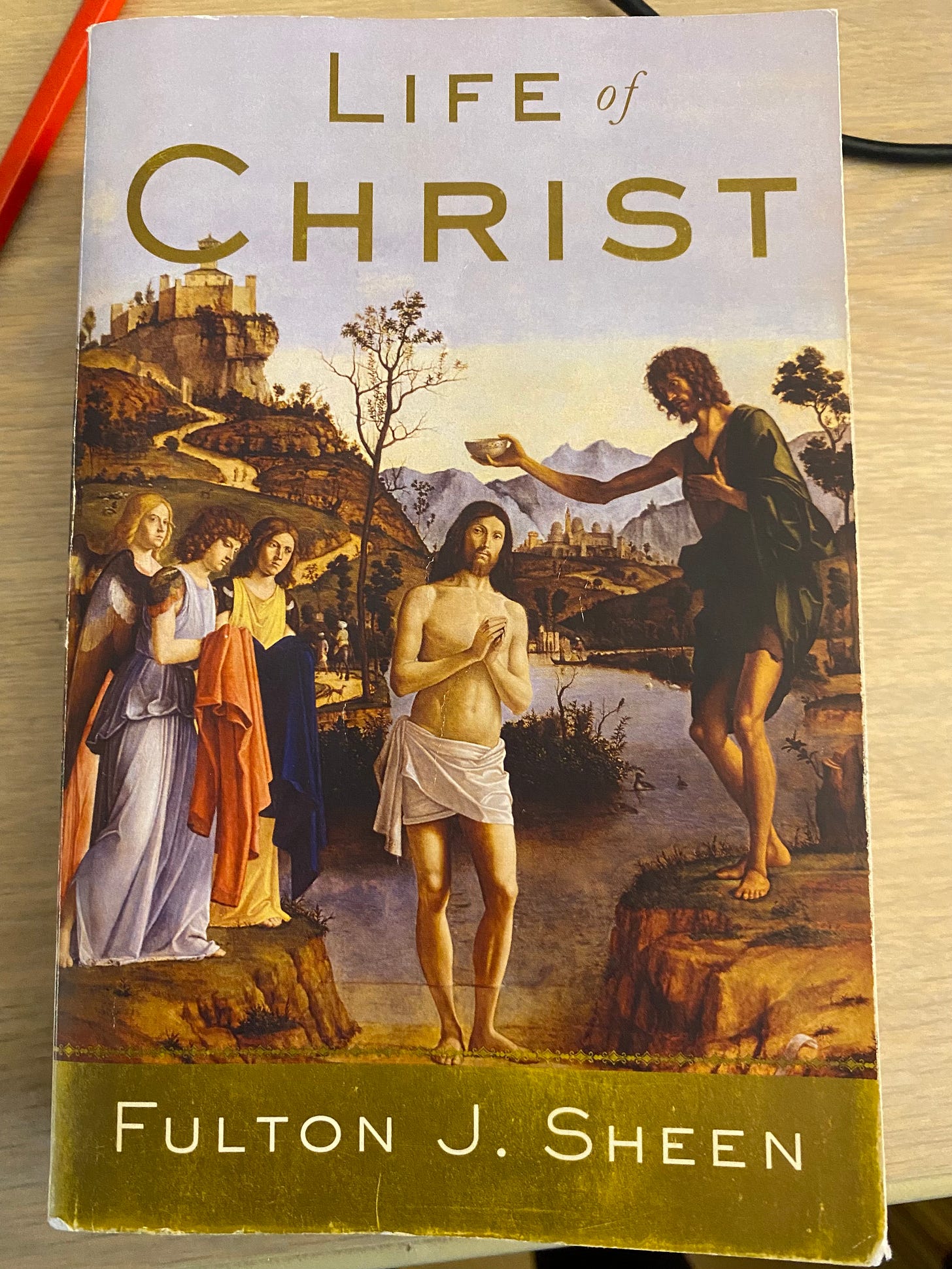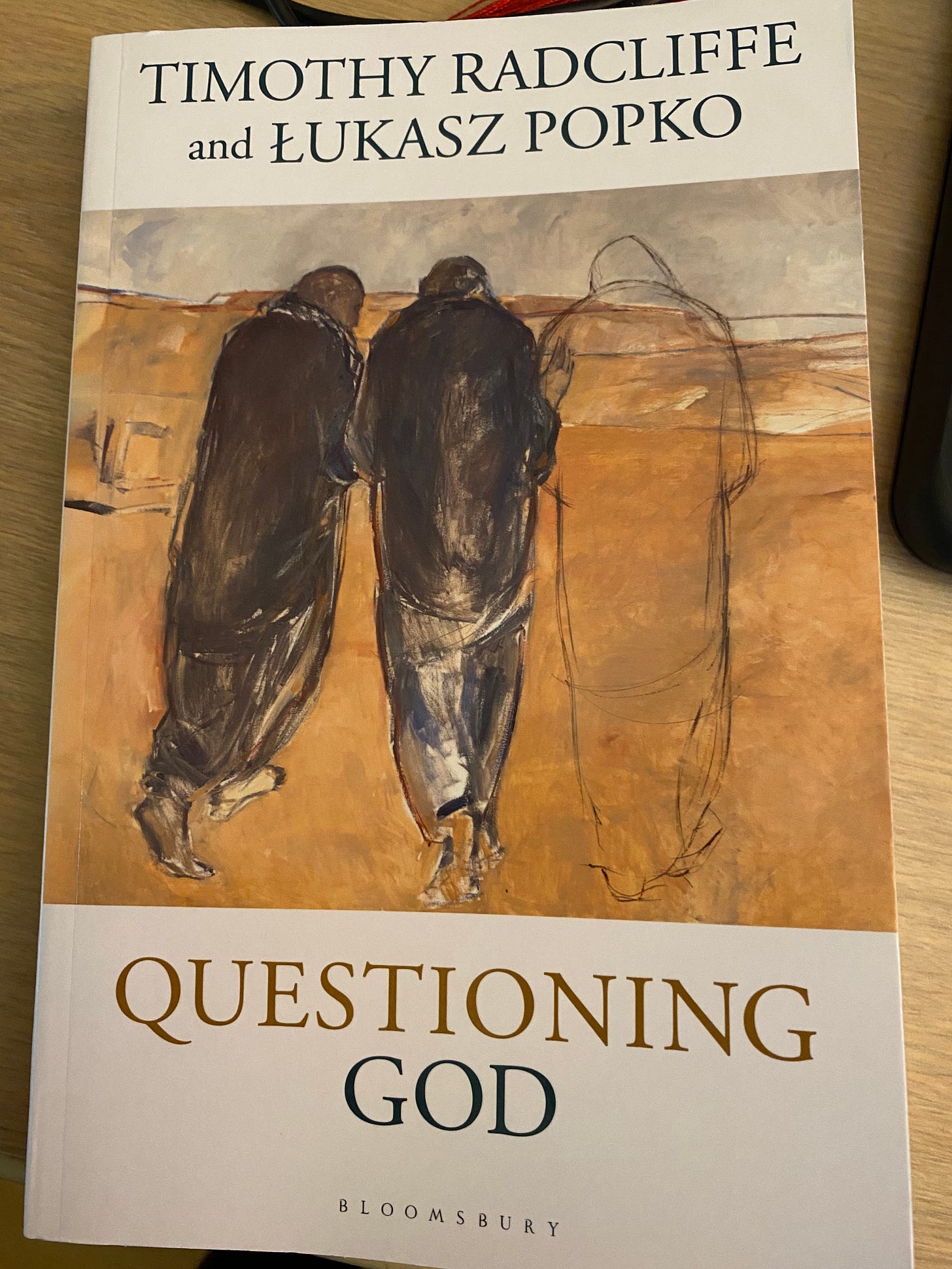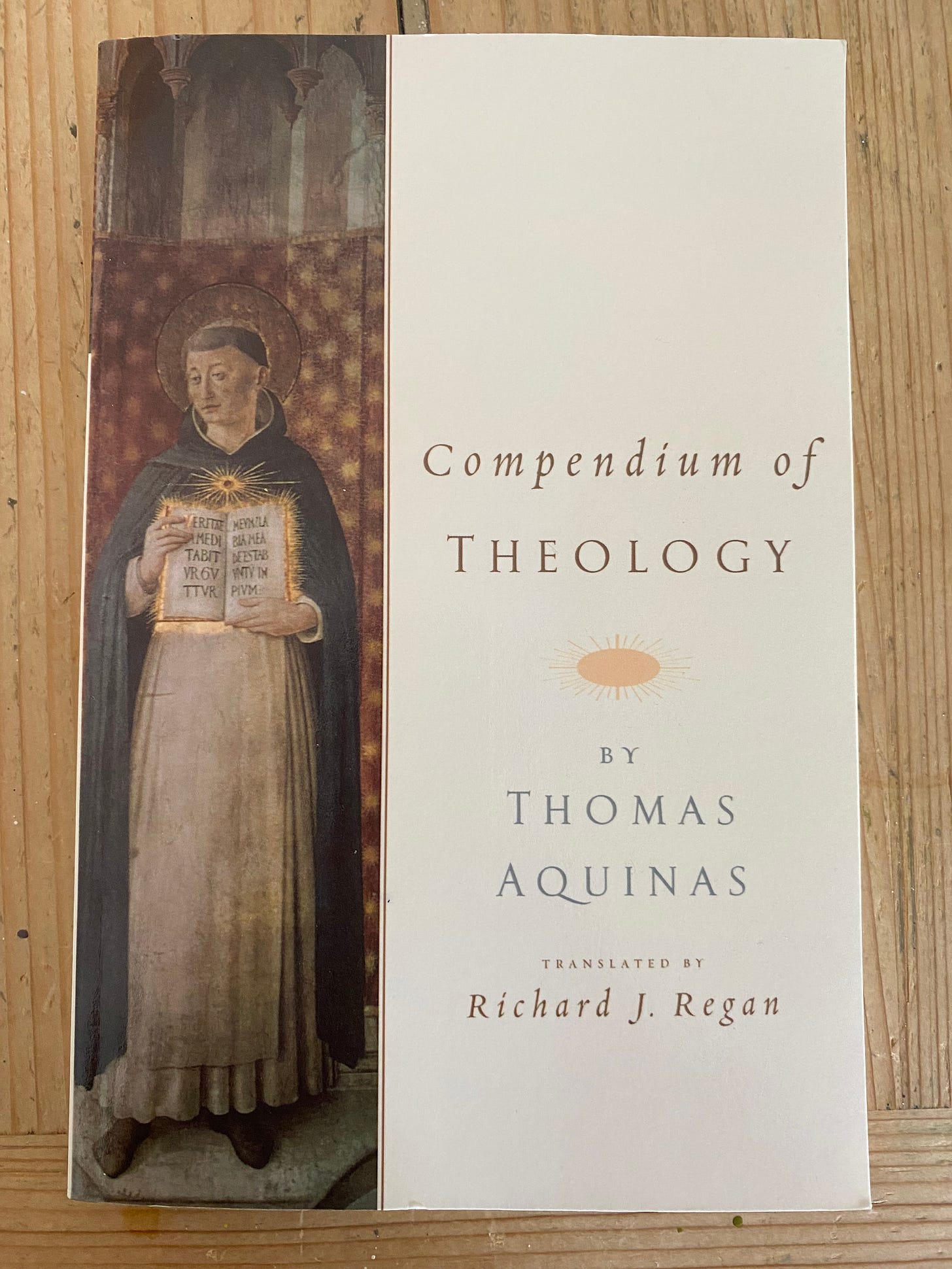Lent Reading Suggestions
The Bible, Not the Bible, and What I Will Read
As I had mentioned in my Looting for Ideas this past Friday, it seemed good to me to create a personal Lenten reading list.
My sole criterion for this list is that the book strengthens my will to turn away from my sins and cooperate with the Holy Spirit to conform my life to Jesus Christ. It is meant neither to be exhaustive nor exclusive, and I already expect that some books I have not yet read will join this list after I read them (I am specifically thinking about Introduction to the Devout Life by St Francis de Sales)
Suggestions for works to add are most welcome.
The Bible
Often I say that the Bible cheats. Divine Inspiration seems to necessitate putting Scripture at the top of any “best” or “favorite” list. Further in its favor, the Bible is in a certain sense more like a library than a book (I first heard Bishop Barron make that claim many years ago in one of his videos, but I can’t remember which one) and contains different genres and styles. Therefore I shall limit my biblical suggestions to just four.
The Book of Jonah
And the Lord said, “Do you do well to be angry?” (Jonah 4:4)
Jonah is my favorite book in the Old Testament. The book carried me through the darkest point in my life, and is something I return to often (even outside of Lent). I can (and have) spoken at length about the rich lessons a prophet who succeeds magnificently and then asks God to take his life can offer us. Most pertinent for Lent, though, is that the Book of Jonah provided the clearest sense that when God speaks to Jonah God is also speaking directly to me. The entire book communicates this, but Jonah 4:4 was perhaps the first time I felt directly addressed, as though in His Providence God inspired those words for me to hear in 2015.
To quote from The Seven Storey Mountain (but I cannot cite because I have lost my copy), I hope to meet him (Jonah) in heaven. (I hope to meet Thomas Merton in heaven too)
The Book of Job
Then Job answered the Lord:
“I know that thou canst do all things,
and that no purpose of thine can be thwarted.
‘Who is this that hides counsel without knowledge?’
Therefore I have uttered what I did not understand,
things too wonderful for me, which I did not know.
‘Hear, and I will speak;
I will question you, and you declare to me.’
I had heard of thee by the hearing of the ear,
but now my eye sees thee;
therefore I despise myself,
and repent in dust and ashes.”
Job 42:1-6
Job’s experience of suffering makes this a worthy Lent read. Like everything in Scripture, there is always more to be said. I have used this quote as the core for a talk on Adoration, and so I find Job 42 very fruitful in turning my attention to Jesus. Job is, after all, a type for Jesus, and points to Him. The quote also provides my model for what Fear of the Lord ought to look like.
The Gospel of Mark
The Spirit immediately drove him out into the wilderness. And he was in the wilderness forty days, tempted by Satan; and he was with the wild beasts; and the angels ministered to him. (Mark 1:12-13)
Ten years ago, I would have said that my favorite Gospel was the Gospel of John. Now I think I might say the Gospel of Mark. That is in large part because of Sunday School Season 1. I recommend it for Lent because there is something in the sheer brevity of the account of Jesus’ temptations that appeals to me this year. The Spirit drives Jesus into the wilderness to do battle with the devil, and he deals with the temptations. No fussing about with the temptations, giving them room to breathe. Dwelling on temptations can sometimes result in resistance corrupting into entertaining. Here Jesus is tempted and moves on. Not bad Lenten advice.
The Letter to the Romans
I do not understand my own actions. For I do not do what I want, but I do the very thing I hate. (Romans 7:15)
This is not my favorite quote from Romans (that would be Romans 14:19). This quote is, however, worth meditating upon in Lent. For as sinners we fail, and St Paul here names an experience that I have no doubt is universal. Lent is not a time to demonstrate our strength by fasting or our virtue in almsgiving. It is a time to admit our weakness and turn to the Lord to heal us. We fast, we pray, and we give alms that we might make space for the Lord our God to correct our desires and teach us to walk in His ways. Also, the third season of Sunday School gave me a much greater understanding of this letter.
Not the Bible
I have not taken the time to categorize the non-biblical reading suggestions in any way. The order is that in which they come to mind as I write this, rather than any ranking.
Life of Christ
…I want My missionaries and martyrs to love Me in prison and death as I loved them in My own suffering. I never worked any miracles to save Myself! I will work frew miracles even for My saints. Begone, Satan! Thou shalt not tempt the Lord, thy God. (Life of Christ, Fulton J Sheen, p 75)
Life of Christ by Fulton J Sheen is one of my favorite books. I first read it in preparation for my university pilgrimage to World Youth Day 2011 in Madrid and have kept it close ever since. This book is an excellent resource to meditate on scenes from the life of Jesus, as each chapter focuses on an episode from the Gospels. In contrast to the virtue of the brevity in Mark’s Gospel noted above, it is the way that Sheen unpacks the temptations from Luke 4:1-13 that prompts me to put it on this list. I have memorized this quote and, in my better moments, come back to it to refocus my attention on Christ.
The chapters which focus on Holy Week, the Passion, and the Resurrection are also excellent.
Confessions
Thou awakest us to delight in Thy praise; for Thou madest us for Thyself, and our heart is restless, until it repose in Thee. (The Confessions of St Augustine, St Augustine, trans. Edward Bouverie Pusey, Book 1 Chapter 1)
Prayer is one of the pillars of Lent, and St Augustine’s Confessions taught me to pray. They are not the only source for that, of course. My parents, pastors, and others have made contributions to my prayer life that I would likely struggle to name. But this book has stamped the form of my prayer. I do not recall ever intending to imitate St Augustine in my prayer. One day I realized, while re-reading the Confessions, that my prayer, at its best, is in the language of this book. I have memorized the opening of those book and it refocuses my attention on God.
The Way of a Pilgrim
My parents gave me The Way of a Pilgrim as a gift many years ago. This work also focuses on prayer, an appropriate theme for any time of the year but especially for Lent. The work is by an anonymous Russian author, and is the account of a man who hears St Paul’s exhortation to pray constantly, takes it seriously, and tries to discover what St Paul meant. Bishop Barron made a good video on this book many years ago which should make up for the absence of a quote.
Perelandra
Then all at once it was night. “Ransom…Ransom…Ransom…Ransom,” went on the voice. And suddenly it crossed his mind that though he would some time require sleep, the Unman might not. (Perelandra, by CS Lewis, in The Space Trilogy, Omnibus: Three Science Fiction Classics in One Volume: Out of the Silent Planet, Perelandra, That Hideous Strength, p336)
CS Lewis is my favorite author, and the Space Trilogy is my favorite work of his. I first read the Space Trilogy as a freshman in college. When I went to college I grabbed a bunch of books from the bookshelf in my bedroom and set them up on my desk in my dorm room. The only one I read that year was the Space Trilogy (which I had in a single volume). At that point I had no idea who CS Lewis was, and in Lent of 2010 I happened to pick it up off my desk and start reading it for no discernible reason. Many years later I asked my parents where they got it, and they had never read it and had no recollection of ever acquiring it.
It captivated me immediately, and I binge read the book. I would even rise early to read, something wildly out of character for me at 18 years old. Since then I have read it at least four more times.
I picked Perelandra as my suggestion for the way Ransom struggles with the Unman in the book. Lent ought to be a struggle, and it can be over-spiritualized to the point where, for example, giving up chocolate becomes a hollow ritual which we effectively deny God the opportunity to radically transform us. It is also good to remember, from time to time, that there is a Foe against whom we struggle but cannot defeat by our own power.
Questioning God
How could Jacob understand his relationship with the God of his father in this complex experience of life and his complicated relationship with his father? (Questioning God, by Timothy Radcliffe and Lukasz Popko, p 36)
Questioning God by Timothy Radcliffe OP and Lukasz Popko OP is a new book to me. I have only just finished it, and it is another book which lends itself to slow reading and meditation. I have learned a great deal from this book. Lukasz Popko, OP’s translations of different sections of Scripture are brilliant. He takes them out of the kinds of translations to which I am accustomed and makes the sections feel new, strange, and perplexing. It forces the reader to grapple with the small sections of text in a new way.
This book makes my suggestion list because it takes the form of a dialogue. It is a back-and-forth between Radcliffe and Popko, and I think it is a good reminder that we are called to the Lord as individuals and as a people. Both Dominicans obviously have done a great deal of personal study. They do not horde the fruits of their individual labor but bring them to the conversation and share them freely with one another, and with the reader. Lent is about penance and turning back to the Lord, but we must support our brothers and sisters. It is likely that something the Lord gives to me this Lent is meant for someone else as well.
What I Will Read
I will most likely be reading sections from the above suggestions this Lent. I will also be meditating upon a few passages from Essays on Catholicism, Liberalism, and Socialism Considered in Their Fundamental Principles by Juan Donoso Cortes. Yes, really. This 19th century Spanish reactionary had some remarkable insight into pain, the human faculty of choice, and on punishment from God as a sign of hope in the fidelity of God’s continued relationship with mankind.
My particular Lent reading book this year will be this, though.
Compendium of Theology
The Compendium of Theology by Saint Thomas Aquinas is an unfinished work. Intended to have one part on Faith, one part on Hope, and one part on Charity, Aquinas only completed the first and part of the second. It is good to return to the basics and re-nourish my understanding of God. This work will certainly become a mainstay of mine. However I think its very incompleteness is something that will be fruitful for me. St Thomas Aquinas never got to the section on Charity, which means I must “supply it myself”. Its absence is a challenge which is entirely fitting for Lent. I could never “complete” the Compendium for Aquinas. But I can use what he wrote to direct me to the Living God Who can, and will, heal, correct, and guide my will so that my actions build up the love of God and love of neighbor.
In the comments, please list any works you think would be good Lent reads. I am always seeking excuses to purchase new books!
And a big thank you to
and their initial post which prompted me to do this. So if you do not like any of my suggestions, go check out their list and see if you find something more suitable for you.





Love it!